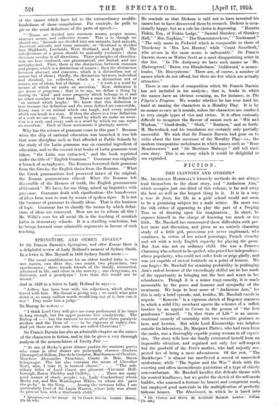SPRINGTIME, AND OTHER, ESSAYS.* IN Sir Francis Darwin's Springtime, and
other Essays there is a delightful review of Lady Holland's memoir of Sydney Smith. In a letter to Mrs. Meynell in 1810 Sydney Smith wrote :-
" The usual establishment for an eldest landed baby is, two wet nurses, two ditto dry, two aunts, two physicians, two apothecaries ; three female friends of the family, unmarried, advanced in life, and often in the nursery ; one clergyman, six flatterers, and a grandpapa ! Less than this would not be decent."
And in 1829 in a letter to Lady Holland he says :- " Jeffrey has been here with his adjectives, which always travel with him. His throat is giving way ; so much wine goes down it, so many million words would leap out of it, how can it rest ? Pray make him a judge."
To Murray he writes :-
" I think Lord Grey will give me some preferment if he stays in long enough, but the upper parsons live vindictively. The Bishop of — has the rancour to recover after three paralytic strokes, and the Dean of — to be vigorous at eighty-two. And yet these are the men who are called Christians ! "
Sir Francis Darwin has also an admirable chapter on the names of the characters in fiction, and in this he gives a very thorough analysis of the nomenclature of Vanity Fair :- " At one of Becky's great dinner parties the eminent guests who come in after dinner are principally cheeses—Duchess (Dowager) of Stilton, Due de la Gruyere Marchioness of Cheshire, Marchese Alessandro Strachino, dante de Brie, Baron Schapzuger. The list also contains the name of Chevalier Tosti, who, I take it, is toasted cheese." . . . " The sub- sidiary titles of Lord Gaunt are pleasant—Viscount Hell- borough, Baron Pitchley and Grillsby. . . . There are many good names of shady people ; e.g., Lady Crackenbury whom Becky cut, and Mrs. Washington White, to whom she gave the go-by' in the Ring. . . . Among the virtuous folks, I am particularly fond of Sir Lapin Warren, whose lady was about to present him with a thirteenth child."
• Sprinatinu, and other Essays. By Sir Franci3 Darwin. London: Murray. Lis. C& net,' He reminds us that Dickens is said not to have invented his names but to have discovered them by research. Dickens is occa- sionally happy, but as a rule his choice is depressing. " Horatio Fizkin, Esq., of Fizkin Lodge," " Samuel Slumkey, of Slumkey Hall," " Mrs. Nupkins," " The Slummintowkens," " Nockemorf." " The only name in Pickwick which is comparable to those of Thackeray is Mrs. Leo Hunter,' while ' Count Smorltork,' who occurs in the same scene, is unbearable." Sir Francis Darwin shows us Walter Scott as a most disappointing artist in this line. " In The Antiquary we have such names as ' Mr. Blattergrowl,' Baron von Blunderhaus," Goldiword,' a money- lender, Dr. Heavysterne.' There are, of course, a number of names which do not offend, but there are few which are actually attractive."
There is one class of composition which Sir Francis Darwin has not included in his analysis ; that is, books in which the names have an obvious meaning, as, for instance, in The Pilgrim's Progress. We wonder whether he has ever tried his hand at naming the characters in a Morality Play. It is by no means so easy as it sounds, unless the characters are confine 1 to very simple types of vice and virtue. It is often curiously difficult to recapture the flavour of names such as " Wit and Wisdom," " Good-deeds," " Sloth," " Business," and so forth. M. Maeterlinck and his translators are certainly only partially successful. We wish that Sir Francis Darwin had gone on to write about the true successor of the Morality Play—i.e., tho modern transpontine melodrama in which names such as " Rose Meadowsweet " and " Sir Mortimer Malways " still tell their own story. This is an essay which it would be delightful to see expanded.


































 Previous page
Previous page